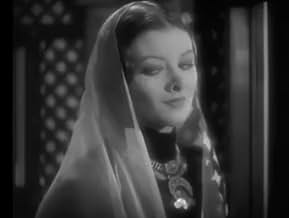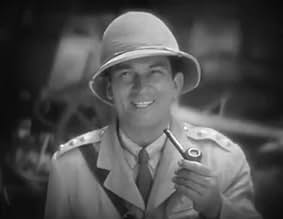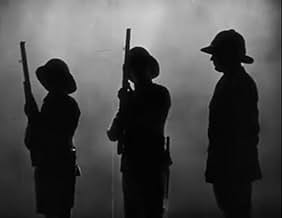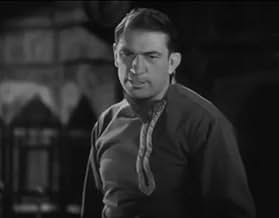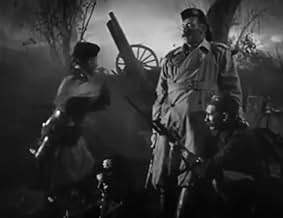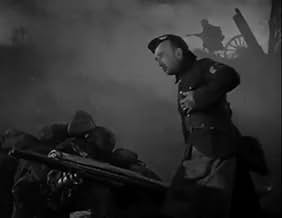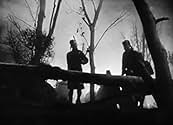Füge eine Handlung in deiner Sprache hinzuCaptain Donald King of the British Army goes to India just as World War I breaks out, convincing his comrades that he is a coward. In reality, he is on a secret mission to rescue British sol... Alles lesenCaptain Donald King of the British Army goes to India just as World War I breaks out, convincing his comrades that he is a coward. In reality, he is on a secret mission to rescue British soldiers held prisoner there.Captain Donald King of the British Army goes to India just as World War I breaks out, convincing his comrades that he is a coward. In reality, he is on a secret mission to rescue British soldiers held prisoner there.
- Regie
- Drehbuch
- Hauptbesetzung
Claude King
- General in India
- (as Claud King)
Harry Allen
- Sandy
- (Nicht genannt)
Frank Baker
- 42nd Highlander
- (Nicht genannt)
William Begg
- 42nd Highlander
- (Nicht genannt)
Arthur Clayton
- 42nd Highlander
- (Nicht genannt)
Joseph Diskay
- Muezzin
- (Nicht genannt)
Francis Ford
- Maj. MacGregor
- (Nicht genannt)
Gregory Gaye
- 42nd Highlander
- (Nicht genannt)
Empfohlene Bewertungen
Most of the time criticism about film remakes will usually run to 'not as good as the original' and most time it isn't. In this case the 1953 remake of this story that Henry King did starring Tyrone Power was miles superior to this early sound feature.
Later on Victor McLaglen got back to colonial India in better features like Gunga Din and Wee Willie Winkie also for John Ford. The only distinction this film has is it is John Ford's first talkie and it's a good thing someone decided to give him another chance.
Neither film is true to the original novel by Talbot Mundy. This version takes place on the eve of World War I as the famed Scottish Black Watch Regiment is in their mess having a last blowout before leaving for the front. During the course of the good times, Captain Victor McLaglen is sent for.
He's been brought up in India, knows Hindustani, Pushtu, and all the languages of that key area of the Khyber Pass. They've got an assignment for him. He's to let it get around that he used some pull to get that transfer to India so that folks will think him a coward. Then when he gets to India with the rumors flying, he's to desert and infiltrate the camp of a nasty group of rebels who are being led by a white Princess Yasmani, played by Myrna Loy.
So with trusty Moslem aide Mitchell Lewis, McLaglen does just that and of course Loy falls for him in just about the same way that Madeline Kahn fell for Cleavon Little in Blazing Saddles. In fact this film didn't need John Ford, it could have been a Mel Brooks triumph if it had been worked right.
But it wasn't a comedy, or at least an intentional one. By the way Loy is a descendant of Alexander the Great and because she was white it would be OK for McLaglen and her to do some kanoodling. Got to think of that southern market. She's also got Roy D'Arcy and Walter Long in her camp panting good and hard after her also, but when she sees McLaglen, it's just like Little and Kahn.
By the way, I couldn't quite figure out what these rebels were. They seemed to have aspects of both the Moslem and Hindu religion there. Certainly in Islam you wouldn't have a woman at the head of things in what is a traditional Islam movement. I attribute that to incredibly sloppy research.
John Ford gets his innings in during the Scottish Mess Hall scenes at the beginning and end of the film. Otherwise you'd hardly know it was a film of his.
And the biggest story of the film is the early sound recording picked up McLaglen saying Loy's character name of Yasmani as Yes, Minnie. Purportedly they edited it out because of the hoots it got during the premiere. I did hear one Yasmani come out of McLaglen and it could have been a Yes, Minnie. Myrna and her friends thought it was hilarious for the next 64 years of her life, her good friends called her Minnie.
John Wayne and Randolph Scott are supposed to be extras in this and they could have been. But I searched in vain for them.
Better their names not be attached to this one.
Later on Victor McLaglen got back to colonial India in better features like Gunga Din and Wee Willie Winkie also for John Ford. The only distinction this film has is it is John Ford's first talkie and it's a good thing someone decided to give him another chance.
Neither film is true to the original novel by Talbot Mundy. This version takes place on the eve of World War I as the famed Scottish Black Watch Regiment is in their mess having a last blowout before leaving for the front. During the course of the good times, Captain Victor McLaglen is sent for.
He's been brought up in India, knows Hindustani, Pushtu, and all the languages of that key area of the Khyber Pass. They've got an assignment for him. He's to let it get around that he used some pull to get that transfer to India so that folks will think him a coward. Then when he gets to India with the rumors flying, he's to desert and infiltrate the camp of a nasty group of rebels who are being led by a white Princess Yasmani, played by Myrna Loy.
So with trusty Moslem aide Mitchell Lewis, McLaglen does just that and of course Loy falls for him in just about the same way that Madeline Kahn fell for Cleavon Little in Blazing Saddles. In fact this film didn't need John Ford, it could have been a Mel Brooks triumph if it had been worked right.
But it wasn't a comedy, or at least an intentional one. By the way Loy is a descendant of Alexander the Great and because she was white it would be OK for McLaglen and her to do some kanoodling. Got to think of that southern market. She's also got Roy D'Arcy and Walter Long in her camp panting good and hard after her also, but when she sees McLaglen, it's just like Little and Kahn.
By the way, I couldn't quite figure out what these rebels were. They seemed to have aspects of both the Moslem and Hindu religion there. Certainly in Islam you wouldn't have a woman at the head of things in what is a traditional Islam movement. I attribute that to incredibly sloppy research.
John Ford gets his innings in during the Scottish Mess Hall scenes at the beginning and end of the film. Otherwise you'd hardly know it was a film of his.
And the biggest story of the film is the early sound recording picked up McLaglen saying Loy's character name of Yasmani as Yes, Minnie. Purportedly they edited it out because of the hoots it got during the premiere. I did hear one Yasmani come out of McLaglen and it could have been a Yes, Minnie. Myrna and her friends thought it was hilarious for the next 64 years of her life, her good friends called her Minnie.
John Wayne and Randolph Scott are supposed to be extras in this and they could have been. But I searched in vain for them.
Better their names not be attached to this one.
This might have fared better with a stronger leading character because, for my money, getting Victor McLaglen to play a captain in the Royal Scots engaging in some tribal Indian subterfuge was just a mission too far! Anyway, he is "King" who just as his regiment is heading for France is re-routed to the Northwest Territories of India on a top secret mission. His erstwhile colleagues view this as akin to desertion, but we know that his task to discover and destroy a massive arms dump that could spell doom and destruction for the Raj and rescue some hostages is something that this locally born man is best suited to do. Pretty effortlessly this six-foot gent finds and infiltrates the tribe and thanks to the sponsorship of it's high priestess "Yasmani" (Myrna Loy) manages to formulate a plan to thwart the cunning antics of the would-be revolutionaries. The last ten minutes or so bring the story alive and allow the engaging McLaglen to show us a little of the glint in his eye, but the rest of this is a remarkably stage-bound exercise that rarely ventures outdoors and rather than steeping us in end-to-end action, rather drowns us in end-to-end dialogue. Loy looks every inch the star, but more of the silent movies than a talkie as her poise is perfect but her pitch "will you obey my commands?" much less so. Inadvertently, perhaps, the conclusion also reminds us just how the tiny contingent of British soldiers did manage to subdue a population hundreds of times their number and of course there isn't a great deal of jeopardy as the story takes a bit too long to reach it's predictable end. I do like the genre, but this is just a bit too static an interpretation of derring-do to stick in the mind for long with some of the editing looking like it was done on a rollercoaster.
John Ford is in my opinion the greatest director that ever lived, and he rarely ever made a misstep. Many people have listed The Black Watch as a misstep, but in context I do not think that it is. It is true that it is dated in the way that the dialogue is spoken, but find me one sound picture from 1929 that is not.
The problem was with sound pictures themselves, the movies had developed into near perfection in 1927-1928. But then sound became all the rage, and it wasn't profitable anymore for the studios to invest in silent movies. So the masterpieces of the late silent era were put on the back burner for stagy dramas with too much dialog or musicals even more stagy than the dramas.
The Black Watch has Ford's German expressionism influenced photography that he started in the late twenties after meeting F.W. Murnau. It also has the Ford themes of Integration into a society, self sacrifice, and the bond between men.
The one major drawback is the extremely stilted dialogue. No one really understood at the time how sound should be recorded live, which led to really irregular ways of saying lines. With long pauses between each others lines, since they did not want to step on each others' lines, so as to overwork the early microphones.
Victor McLaughlin's acting wasn't his best, but he was much better than Myrna Loy who honestly seemed as though she had been hypnotized before going on the set. I thought the guy who asked forforgiveness for his violence towards his fellow man, who would then do something violent was funny.
Compared to all of John Ford's other films this is near the bottom, but compared to everything else made in sound in 1929 this is at the top of the heap.
The problem was with sound pictures themselves, the movies had developed into near perfection in 1927-1928. But then sound became all the rage, and it wasn't profitable anymore for the studios to invest in silent movies. So the masterpieces of the late silent era were put on the back burner for stagy dramas with too much dialog or musicals even more stagy than the dramas.
The Black Watch has Ford's German expressionism influenced photography that he started in the late twenties after meeting F.W. Murnau. It also has the Ford themes of Integration into a society, self sacrifice, and the bond between men.
The one major drawback is the extremely stilted dialogue. No one really understood at the time how sound should be recorded live, which led to really irregular ways of saying lines. With long pauses between each others lines, since they did not want to step on each others' lines, so as to overwork the early microphones.
Victor McLaughlin's acting wasn't his best, but he was much better than Myrna Loy who honestly seemed as though she had been hypnotized before going on the set. I thought the guy who asked forforgiveness for his violence towards his fellow man, who would then do something violent was funny.
Compared to all of John Ford's other films this is near the bottom, but compared to everything else made in sound in 1929 this is at the top of the heap.
Released in 1929, THE BLACK WATCH is an entertaining flick shot in black & white, and John Ford's first all-talkie film. It's based on the 1916 novel 'King of the Khyber Rifles' by Talbot Mundy.
Captain Donald King (McLaglen) goes undercover and leaves his regiment (Black Watch) to put down a rebellion in India at the at the start of WWI. There he finds the beautiful princess Yasmani (Loy) who plans to send her minions to attack British forces at the Khyber Pass.
As we would expect from a Ford movie it has a good look, especially the outdoor scenes. The Cave of Echoes scenes are well crafted with fine visuals and sound effects.
The problem the movie has is it's dialogue in many scenes, Myrna Loy's in particular, is stilted and stagy , as if they thought the mics couldn't keep up with their voices. Still, a good movie.
Captain Donald King (McLaglen) goes undercover and leaves his regiment (Black Watch) to put down a rebellion in India at the at the start of WWI. There he finds the beautiful princess Yasmani (Loy) who plans to send her minions to attack British forces at the Khyber Pass.
As we would expect from a Ford movie it has a good look, especially the outdoor scenes. The Cave of Echoes scenes are well crafted with fine visuals and sound effects.
The problem the movie has is it's dialogue in many scenes, Myrna Loy's in particular, is stilted and stagy , as if they thought the mics couldn't keep up with their voices. Still, a good movie.
John Ford had notched up almost 50 films in the director's chair when he took on this project in the late 20's coinciding with the advent of sound.
Far less well known than its 1953 re-make (known AS KING OF THE KHYBER RIFLES) with Tyrone Power in the Victor McLlaglen role, the story is that of British Army Officer Captain King, who encounters way more than he expected when he is asked to put down an Indian rebellion up around the Khyber Pass.
Very dated now and without the benefit of wide screen color which so enhances desert dramas especially, BLACK WATCH is still an interesting time-capsule. I saw it many years ago on late night TV, both to compare with the later version and to see how John Ford's direction held up in 1929. On both counts, the film scored well!
Far less well known than its 1953 re-make (known AS KING OF THE KHYBER RIFLES) with Tyrone Power in the Victor McLlaglen role, the story is that of British Army Officer Captain King, who encounters way more than he expected when he is asked to put down an Indian rebellion up around the Khyber Pass.
Very dated now and without the benefit of wide screen color which so enhances desert dramas especially, BLACK WATCH is still an interesting time-capsule. I saw it many years ago on late night TV, both to compare with the later version and to see how John Ford's direction held up in 1929. On both counts, the film scored well!
Wusstest du schon
- WissenswertesThis was the first sound feature that John Ford directed. Unable to shout orders to the actors, he had his brother, First Assistant Edward O'Fearna dress up as a rifleman and mingle with the crowd whispering Ford's instructions to the principal actors.
- Zitate
General in India: Forget your schoolboy scruples. This is war.
- VerbindungenFeatured in Hollywood - Geschichten aus der Stummfilmzeit (1980)
Top-Auswahl
Melde dich zum Bewerten an und greife auf die Watchlist für personalisierte Empfehlungen zu.
- How long is The Black Watch?Powered by Alexa
Details
- Erscheinungsdatum
- Herkunftsland
- Sprache
- Auch bekannt als
- King of the Khyber Rifles
- Produktionsfirma
- Weitere beteiligte Unternehmen bei IMDbPro anzeigen
Box Office
- Budget
- 400.000 $ (geschätzt)
- Laufzeit1 Stunde 33 Minuten
- Farbe
Zu dieser Seite beitragen
Bearbeitung vorschlagen oder fehlenden Inhalt hinzufügen

Oberste Lücke
By what name was The Black Watch (1929) officially released in India in English?
Antwort
